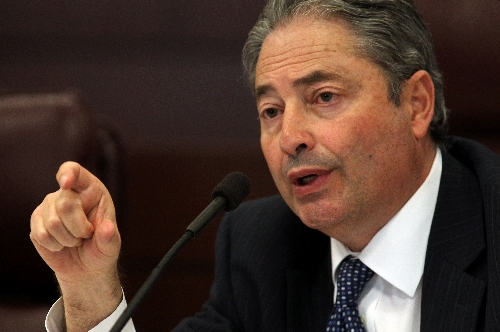Recession took Nevada Economic Forum chairman by surprise

When the $5 trillion housing bubble ruptured like an aneurism in 2008, the economy imploded. Home values plummeted — some say back to earth where they belonged in the first place — and millions of jobs suddenly vanished.
Few saw it coming, not even John Restrepo, the chairman of the Nevada Economic Forum, who quietly declared personal bankruptcy in November. The economist empowered to tell lawmakers just how much money they will have on hand to pay for government services wasn’t able to predict his own financial downfall.
"It happened so fast," Restrepo said. "My personal situation was just like the national situation. Nobody saw this coming. Wall Street didn’t see it, the Fed didn’t see it. Do you really think the MGM would have built CityCenter if their top financial guys saw this?"
Restrepo had an inkling the housing market was about to soften and so when he and his wife purchased their $379,000 home — now valued at $225,000, according to court papers —- he factored in a market correction of about 25 percent. "I figured that would have been it but nobody saw the depth and breadth of this Great Recession," he said, "which we probably should call a depression."
Restrepo is not alone. A recent report indicates 11 out of every 1,000 Nevadans declared bankruptcy in 2010. While the numbers have stabilized in both bankruptcies and foreclosures, Restrepo warned that better days are not right around the corner.
Restrepo, 58, said he’s from the generation that considers filing for bankruptcy a failure, something to be avoided at almost any cost. So he started downsizing Restrepo Consulting, which isn’t part of his personal bankruptcy, and got rid of "nonessential" expenditures.
At the same time, he began to save for a rainy day. He had no idea it was about to start pouring.
"I offer services to three types of clients: commercial and residential developers, state and local government entities, and the resort industry — all three of them got hit hard and no longer needed my services."
‘A MORAL THING’
Restrepo considers bankruptcy a last resort. "It’s a moral thing with me," he said.
More and more essential items were added to his "nonessential" expenditure cuts. He burned through his savings paying off creditors, staff, and vendors. By summer 2010, "I knew I had to go see a lawyer."
Self-employed with people who depend upon him for their own livelihoods, Restrepo was able to keep the doors open to his business and paid off his "local" guys before he filed.
A member of the Economic Forum for more than three years, Restrepo could have helped his financial cause by taking on consulting work with big companies that lobby the Legislature.
While Nevada law is hazy on the ethics of him doing so, Restrepo sought to avoid any impropriety.
He also considered quitting the forum after filing for bankruptcy but the self-described moderate Democrat appointed by former Republican Gov. Jim Gibbons didn’t want to leave midterm.
The economists and other business leaders on the forum are volunteers.
Like most Americans, the bulk of Restrepo’s debt was in credit cards, which he considers the primary reason why the economy tanked and is taking so long to recover.
Restrepo said nobody should or could be fully blamed for the economy. "This recession has behaved like no other in history," he said, "and it continues to do things that are unexpected."
LESSONS LEARNED
So what has all this taught the Economic Forum?
Created in 1994 to make lawmakers’ financial decisions more objective and less political, the forum meets only once a year: In May in odd-numbered years when the Legislature is in session, and in December in even-numbered years.
Restrepo’s first recommendation: meet at least quarterly to have more time to react.
"Usually, recessions in Nevada are pretty moderate and the recovery is relatively rapid" compared to the rest of the country, he said. "This time, the recession went a lot deeper than anyone anticipated."
Governors appoint members to the forum and history shows the men and women chosen have been accurate and academic in their approach. "We’re not pessimists. We’re not optimists. We’re realists," he said. "We’ve done a good job being realistic in my opinion."
The problem was, when the money was rolling in and housing prices were increasing by 150 percent over the prior year, nobody wanted to believe the bottom would ever fall out.
Restrepo said he will survive bankruptcy and he suggests that anyone facing financial peril consult a bankruptcy attorney. Do your homework, he said, and find one that has been doing them for a while.
A broader economic recovery depends on the job market improving, he said.
"Southern Nevada needs consumers to have confidence. There is so much misunderstanding about the housing bubble burst. It was so much more. There was also massive unemployment and because employers had never seen a recession behave this way, they were slow to rehire. We had 12.1 percent unemployment claimed in April but the actual figure is probably closer to 20 percent.
"In the Great Depression 70 years ago, unemployment bottomed out at 25 percent," he said. "In Las Vegas, people have given up looking or they’ve left town, but the recovery has been anemic because not enough jobs have been created to make a difference."
So what’s the forecast? Partly cloudy, at best.
"May 2011 looks a lot better than May 2010. And May 2010 looked better than May 2009. But we might not ever get back to looking like May of 2006," the last boom year in Southern Nevada.
For those contemplating bankruptcy, Restrepo says there are no quick fixes. "Everybody’s situation is different," he said. "The important thing is to do the right thing as well as you can."
Contact Doug McMurdo at dmcmurdo @reviewjournal.com or 702-224-5512.
Political Eye blog











